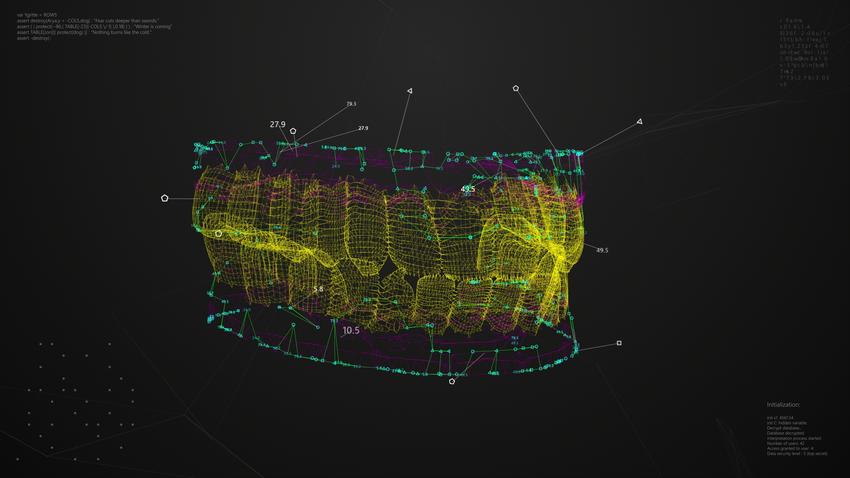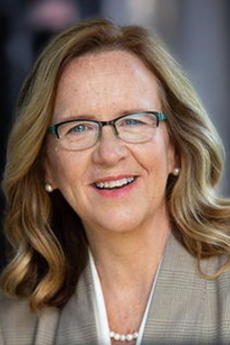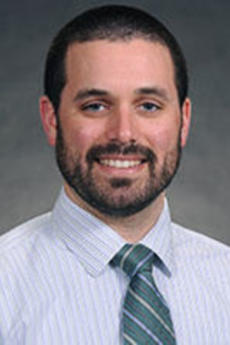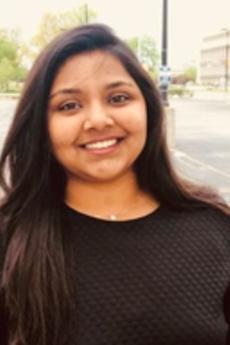Researchers, clinicians explore how data and artificial intelligence can enhance dentistry

School of Dentistry researchers and clinicians are doing big things with big data—looking excitedly toward a future where artificial intelligence and data can help dental providers be the best clinicians they can be.
Sheila Riggs, DDS, MS, DMSc, has always had an interest in big data and AI, and she sees them as inextricably connected. “To me, AI is really big data on steroids,” she quipped.
Her interest in the field began early in her career, and inspired her post-doctoral career path. After receiving her second doctorate from Harvard, Riggs became an executive at Blue Cross Blue Shield of Iowa, creating an analytics division that focused on claims data. “Of course, the world has only exponentially grown,” she said, “but I’ve had a long interest in what you can learn from analyzing databases.”
Riggs’s interest was piqued when she first heard of OverJet, a clinical dental artificial intelligence platform whose Chief Dental Officer, Terri Dolan, DDS, was a colleague. “I’ve always thought the world of her, and I knew that if she was in charge, I could feel good about where the direction of data analysis would go,” she explained.
After running into one another at the American Association for Dental, Oral and Craniofacial Research meeting in 2022, Riggs and Dolan began to talk more about the role of data and AI in dentistry. It was perfect timing, as Dean Keith Mays, DDS, MS, PhD, would include the incorporation of AI in the dental curriculum in the School of Dentistry’s strategic plan.
Riggs invited Dolan and other experts to the School of Dentistry to present a lunch and learn on the concepts of data and AI in dentistry. This event and other discussions led to a publication in the Compendium of Continuing Education in Dentistry entitled Preparing the Next Generation of Clinicians for Practice Using Augmented and Artificial Intelligence. The piece discussed methods of incorporating AI into education and allowed each author to share a bit about their university’s incorporation of data into the classroom and clinical work.
“It came, like so many things do, out of a personal passion and relationships,” Riggs said.
Riggs is pleased with the publication and excited to open the door to more information on artificial intelligence and data—including sharing the spotlight with other experts at the School of Dentistry.
Those experts include Laurence Gaalaas, DDS, MS, clinical assistant professor, and Nikhita Kutala, BDS, MHI, dental data analyst at the Clinical and Translational Science Institute.
Gaalaas is a diagnostic radiologist who sees artificial intelligence as a tool in the diagnosis and analysis of disease, bone loss and more. His primary experience with AI thus far has been as a consultant to those pursuing AI-based diagnosis. “Though I have not seen evidence to support that AI-aided dental radiographic diagnosis can diagnose better than a well-trained clinician, there is promising evidence that these systems can diagnose disease with equal accuracy under certain circumstances,” he said. “It is my hope and expectation that AI-diagnostic tools will serve as diagnostic aids to the dental clinician, increasing their diagnostic speed and efficiency and reducing errors.”
Gaalaas noted that the work being done to incorporate AI into radiology is just beginning, and there is much room to grow—but he is excited to see what comes next. “As a diagnostic radiologist, I’m looking forward to employing new tools to increase the efficiency of my work,” he said. “As an educator, researcher and member of the School of Dentistry faculty, I’m hopeful that I can someday use AI and big-data based tools to recognize patterns and tell us information about patients, and students, that we have not yet recognized.”
Though Nikhita Kutala, BDS, MSI, does not work with AI, her job has her fully immersed in data. As a dental data analyst, Kutala is tasked with capturing, preparing and analyzing data reports for research studies faculty members wish to pursue.
One big part of Kutala’s role includes pulling information from the Big Mouth Data Repository—an anonymized database that pulls data from eleven dental schools, allowing these schools to share valuable information with one another and gather datasets larger than any one school could on its own.
“Any great solution for a problem starts with research first,” she said. “I play a major role in gathering the data our researchers need.”
All three of these experts believe in the power of data and AI, and while the work is just getting started at the School of Dentistry, they’re excited to see what they can accomplish.
“I’ve always believed we were leaving something on the table if we don’t use all these data bits to make us smarter and help us care more effectively for our patients,” said Riggs. “It’s an obvious, 21st-century path to better, more effective patient care.”


